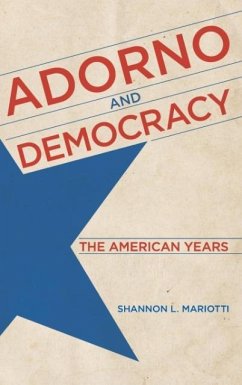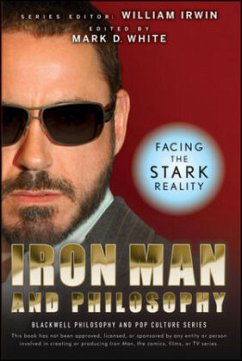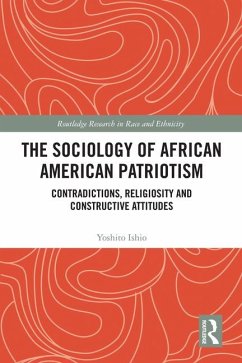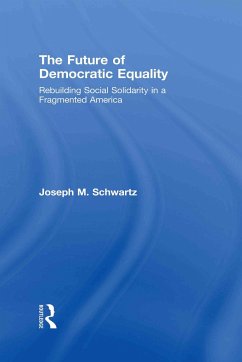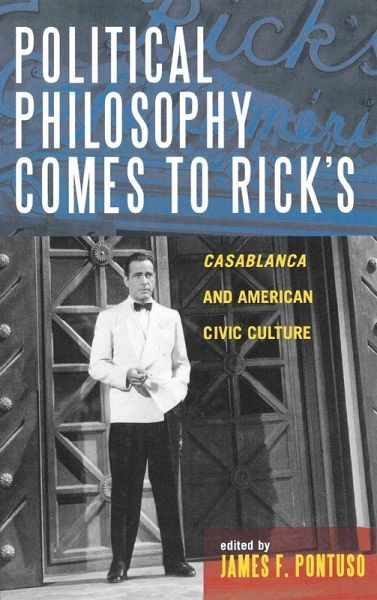
Gebundenes Buch
Political Philosophy Comes to Rick's
Casablanca and American Civic Culture
Herausgeber: Pontuso, James F
Versandkostenfrei!
Versandfertig in über 4 Wochen

PAYBACK Punkte
51 °P sammeln!





Political Philosophy Comes to Rick's focuses on reading one of the world's most watched films, Casablanca, politically. Contributors contend that the popularity of the film lies in its ability to present American civic culture, the American character, if you will, in a thoughtful, dramatic, and enduring way.
James F. Pontuso is Elliot Professor of Political Science at Hampden-Sydney College.
Produktdetails
- Verlag: Bloomsbury Publishing PLC
- Seitenzahl: 208
- Erscheinungstermin: 4. August 2005
- Englisch
- Abmessung: 235mm x 157mm x 17mm
- Gewicht: 499g
- ISBN-13: 9780739108321
- ISBN-10: 0739108328
- Artikelnr.: 22294434
Herstellerkennzeichnung
Libri GmbH
Europaallee 1
36244 Bad Hersfeld
gpsr@libri.de
Without doubt, Casablanca is one of the greatest American films ever made; part of its enduring appeal, the essays in this volume reveal, lies in its ability to reflect the timeless ideas which permeate popular culture. James Pontuso has assembled an eclectic group of essays, exploring the film's moment in history, its place in the careers of Michael Curtiz and Humphrey Bogart, and - most importantly, perhaps - its lessons about the American character and about the relationship between individual happiness and moral or political obligation. -- Christine Henderson, Liberty Fund, Inc. ... an imaginative text that treats cinema in a manner befitting its status, namely, as the new literary genre. Perspectives on Politics We tend to forget that
Mehr anzeigen
the past is often a selective past, fashioned mostly by persons who are of a different time and place, and often according to the fancies of the historian. Such forgetfulness is not evident in James Pontuso's wonderful collection ofessays on one of the landmarks of film, Casablanca. The authors judiciously balance their concern for the enduring political and philosophic questions that emerge throughout the film and a deft understanding of the changes in artistic media and historical context through which those questions are shaped. Political Philosophy Comes to Rick's is a rare form of cultural criticism that works astutely within film medium. The philosophic and political claims are not forced or tortured. We are invited to listen, think, see, and feel.. -- Eduardo A. Velasquez, Washington and Lee University We tend to forget that the past is often a selective past, fashioned mostly by persons who are of a different time and place, and often according to the fancies of the historian. Such forgetfulness is not evident in James Pontuso's wonderful collection of essays on one of the landmarks of film, Casablanca. The authors judiciously balance their concern for the enduring political and philosophic questions that emerge throughout the film and a deft understanding of the changes in artistic media and historical context through which those questions are shaped. Political Philosophy Comes to Rick's is a rare form of cultural criticism that works astutely within film medium. The philosophic and political claims are not forced or tortured. We are invited to listen, think, see, and feel. -- Eduardo A. Velasquez, Washington and Lee University
Schließen
Für dieses Produkt wurde noch keine Bewertung abgegeben. Wir würden uns sehr freuen, wenn du die erste Bewertung schreibst!
Eine Bewertung schreiben
Eine Bewertung schreiben
Andere Kunden interessierten sich für




